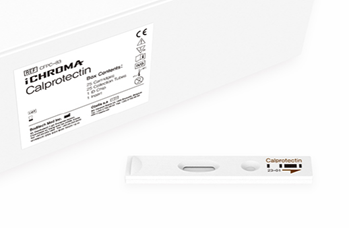| Detection Range | 1-1,000 mg/kg feces |
| Sample Type | Stool |
| CV | <10% |
| Reaction Time | 10 minutes |
i-Chroma Calprotectin
Neutrophils are the common effector cells that define acute inflammation in response to a number of factors. Once the neutrophil migrates to a site of chemo attraction, the contact sets off a cascade of events leading to a respiratory burst, oxygen radical generation, and disintegration of the neutrophil with the release of its cytosolic granules (and Calprotectin), which contain a variety of hydrolytic and proteolytic enzymes. In this way, the neutrophil deals with the chemo attractant but at the same time causes indiscriminate damage to its surroundings.
The amount of Calprotectin reflects the number of participating neutrophils in this inflammation. This has been amply confirmed in intestinal inflammatory diseases by the significant correlation between fecal Calprotectin levels and other measures of acute inflammation.
Faecal Calprotectin is therefore a biochemical measurement of the protein Calprotectin in the stool. Elevated faecal Calprotectin indicates the migration of neutrophils to the intestinal mucosa, which occurs during intestinal inflammation, including inflammation caused by inflammatory bowel disease.



